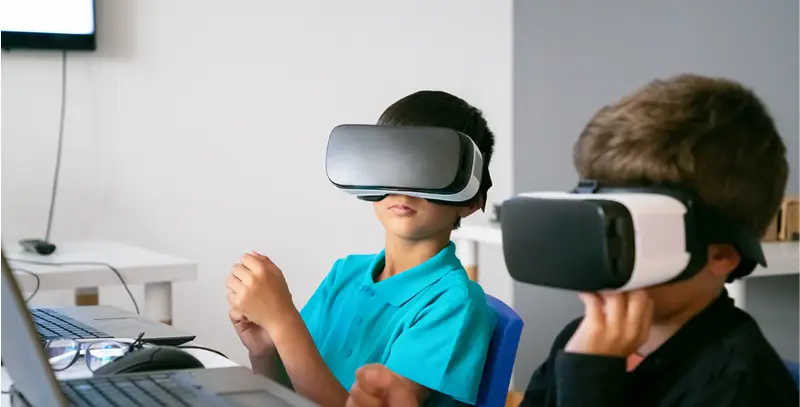Industry: Education
6 Min Read
Introduction
Covid 19 has affected every sphere of life. The Education industry is no exception and the trends have changed for the same due to the onset of the pandemic.
While the traditional methods of face-to-face learning have got a great blow due to covid 19, new methods of online learning have revolutionized the education sector like never before.
Technology has played an important role in maintaining the efficiency and usefulness of online mediums of education. The contribution of mobile apps to this cause is paramount.
Mobile App development companies have been able to turn this adversity into opportunity by blending technology and new ideas in the education sector.
Mobile applications have been able to create a very dynamic, interactive, and interesting environment for students across the globe. Education is way more accessible for students through mobile apps.
Statistics say that the eLearning industry is going to cross $243 billion in 2022.
If you want to understand how mobile applications have benefitted people as well as education providers, this article is for you.
Better engagement
While a traditional classroom can get mundane for students, mobile apps lead to better engagement of students due to their interactive user interfaces.
Moreover, these days, teaching apps make use of educational games and activities (eg. MCQs). These games help students stay interested while giving them brainstorming and creative engagement opportunities.
Accessibility
With mobile apps, missing a lesson once in a while due to some emergency does
not lead to a knowledge gap for students because mobile
apps allow students to access the lessons at any time from anywhere in the world.
Students can pursue their interests at any time of the day with a mobile app. Also, a mobile app allows students the freedom to learn
from anywhere without the need to relocate from one place to another.
Affordability
Learning online or taking a course through a mobile app is way more affordable as
compared to the traditional methods of education. Elearning tools are available to
all students irrespective of their financial and economic backgrounds because they are cost-effective.
It turns out to be a great opportunity for those who cannot otherwise take courses above their affordable range.
Let’s collaborate to turn your idea into a working business model.
Sustainability
The eLearning mobile apps are a sustainable way of imparting education as compared to the traditional paper-based approach. A lot of trees are cut to make paper, whereas a download is all you need on a digital platform.
Personalized attention
It is very difficult for a teacher to communicate individually with every student in a traditional face-to-face class of 40 minutes. While the teacher has to teach the entire class, a mobile app communicates with every student individually.
Mobile apps can adapt to the learning style of the student and tailor the learning content accordingly. There remains no room for frustration or lagging of any student because of such adaptability of progressive mobile apps.
Let's Learn About The Latest Technologies Used In Educational Mobile Apps.
Augmented Reality
Augmented reality is used to augment or enhance our real environment with the use of computer-generated graphics. AR has been doing its magic in the education industry and helping students understand complex topics through its 3D and 4D effects.
Education apps that incorporate AR elements in their apps have an edge over others by making learning interactive and fun for students.
Augmented reality does not completely replace the real world with the virtual one, rather it blends the both in a way that accentuates the experience for better understanding.
Artificial Intelligence
AI refers to an intelligent tutoring system that acts as a virtual assistant for students. It makes learning more accessible with its language processing algorithms. The features like subtitling live speech, summarizing main points, and rephrasing difficult information facilitates the learning process a lot.
This technology has led to the evolution of e-learning applications in a big way. This is a boon for students who have learning disabilities or are generally weak in their studies. It can restructure difficult-to-understand texts into a simpler form.
The advanced models of AI also facilitate easier and more comprehensive ways of problem-solving.
The most special benefits of AI in the eLearning industry are smart content, personalization, real-time interrogation, improved accessibility, virtual facilitators, and a learning environment.
Virtual Reality
Virtual reality refers to the generation of a virtual world experience in a way that the person feels as if they are a part of that virtual world while being present in the real world. It means creating virtual simulations through computer technology.
Virtual reality has led to creating very engaging and immersive experiences for students in the education sector. It allows them to experience out of the classroom world in a much more realistic way thus boosting their understanding.
VR does the job of bringing life to the information in books. A 3D movie is the most common example of virtual reality. The special glasses make the viewer feel as if they are a part of that movie environment and it is all happening in front of their eyes. The light and sound effects also facilitate this feeling of real events in the computer-generated scenes.
It is instrumental in giving students a fresh perspective as well as a real-life experience of the topic they are studying.
In 2018, the virtual reality market in the education sector stood at $656.6 million which is predicted to go up to $13098 million by 2026.
These statistics explain very well why virtual reality must be adopted by the eLearning industry in their courses.
Conclusion
At present, 53% of apps on the app play store are eLearning apps. This easily explains the boom eLearning apps are going through. This high demand is a result of the ease and efficiency that elearning apps bring to the education system.
Here is a quick summary of all benefits of mobile apps for the education industry.
-
Students can access different learning resources from the comfort of their homes through mobile apps.
-
Education through eLearning mobile apps has not only become accessible but affordable also thus bringing equal opportunity to students from financially weak backgrounds also.
-
With the incorporation of technologies like AR, VR, etc., the engagement and interest of students have increased manifold.
-
The hassle-free applicability of eLearning mobile apps not only helps students but facilitates the job of teachers too.
- Students with learning disabilities get special attention while learning using the progressive mobile apps of today.
While having an eLearning app is a plus, getting it made by the industry experts is important. Before choosing your development partners, make sure you find out if they use the latest frameworks and technologies or not.
Not just that, understanding your educational niche, your target audience, and their special needs are integral to making any eLearning platform a success. We, at iotasol, would love to hear about your ideas and collaborate with you on bringing a perfect blend of tech advancement as well as an intuitive and easy-to-operate mobile app for your eLearning platform.







